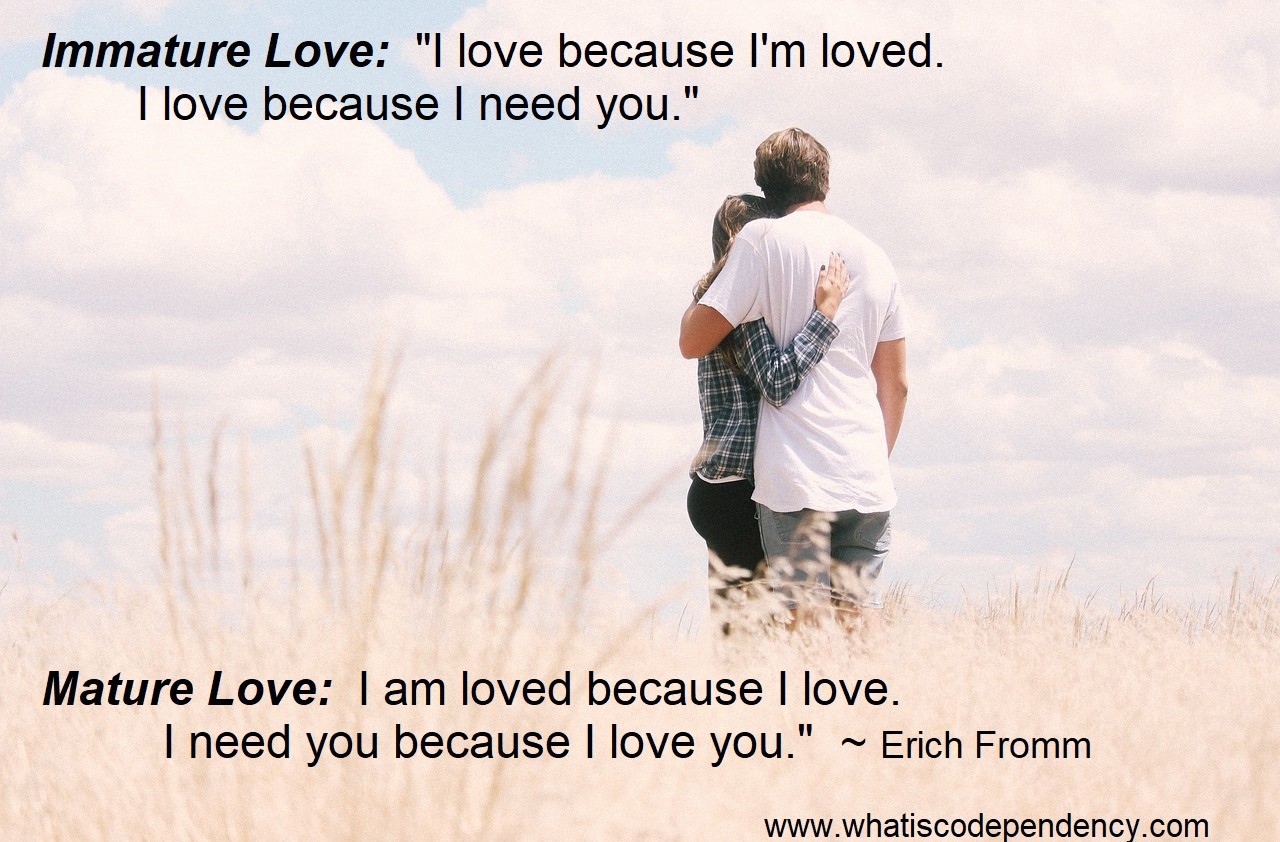
Anyone who?s loved a narcissist wonders, ?Does he really love me?? ?Does she appreciate me?? They?re torn between their love and their pain, between staying and leaving, but can?t seem to do either. It?s confusing, because sometimes they experience the caring person they love, whose company is a pleasure, only to be followed by behavior that makes them feel unimportant or inadequate. Narcissists claim to love their family and partners, but do they?
Whose point-of-view should we consider?the ?lover? or the ?lovee??
Love is a subjective experience. We can?t really know someone?s private experience. Whose point-of-view matters most?the lover or the lovee? Narcissists will claim to love their children, their spouse, and their parents. For them, their love is real. But is it actually love?
Romance vs. Love
Plato described seven types of love: Eros is passionate, physical, romantic love; Philautia is self-love, including healthy self-esteem, hubris, and self-inflation; Ludus is affectionate, fun, and uncommitted love; Pragma is pragmatic love that focuses on long term compatibility and shared goals. Philia love is friendship; Storge is familial and parental love, based on familiarity and dependency; Agape is deep spiritual and unconditional love, including altruism and love for strangers, nature, and God.
Our culture elevates romantic love to the Holy Grail?to be yearned for, sought after, and die for. Eros is not only ephemeral, but it?s also illusory according to Jungian analyst Robert Johnson. He distinguishes love from romance and claims that the passion of romantic love ?is always directed at our own projections, our own expectations, our own fantasies . . . It is a love not of another person, but of ourselves.? (Johnson, 1945) Dorothy Tennov called this limerance?an infatuation about someone with whom we want a relationship, characterized by obsessive thoughts and fantasies, but not necessarily about sex.

How Narcissists Love
Except in the early stages of a relationship, most narcissists aren?t motivated by passion. (Campbell, et al., 2002) Relationships offer narcissists positive attention and sexual satisfaction to support their ego and self-esteem. They may seek someone of exceptional beauty, talent, or influence who admires them. The more special the prize, the more desirable and enhancing to their self-esteem. Narcissists? confidence as well as their status, charisma, and power attract romantic partners.
Good social skills allow them to make a good initial first impression. They?re engaging and energetic, and they possess emotional intelligence that helps them perceive, express, understand, and manage emotions. (Dellic, et al., 2011) This enables them to manipulate people to achieve their aims. They brag about themselves in order to be admired, loved, and gratified. Codependents with low self-esteem are easy targets. They idealize and accommodate narcissists and tolerate their self-centered and abusive behavior. (Lancer, 2014)
Some narcissists are pragmatic in their approach to relationships, focusing on their goals. But most engage in ludic love. (Campbell, et al.) Despite numerous conquests, they remain uncommitted, particularly when they believe they have alternatives (e.g., online dating opportunities). To them, relationships are transactional. They?re playing a game, and winning is the goal.
Amorous narcissists (Don Juan and Mata Hari types) are adept and persuasive lovers. Sexual attraction fuels romance that feeds their hedonistic desires. Their method is seduction. Their means: Generosity, expressions of love, flattery, sex, romance, and promises of commitment. During courtship, narcissists who are skilled communicators show great interest in romantic prospects, but over time they wonder whether that attention is genuine or feigned for ulterior motives. Some narcissists lie and/or practice love?bombing by overwhelming their prey with verbal, physical, and material expressions of love.
Narcissists prioritize power over intimacy. (See Lancer, 2014) They loathe vulnerability, which they consider weak. To maintain control, they avoid closeness and prefer dominance and superiority over others. Game-playing thus strikes the perfect balance to both get their needs met and keep their options open to flirt or date multiple partners. (Campbell, et al.)
When they lose interest and decide the game is over, it?s devastating to their ex, who can?t understand what happened. Breakups are especially hard during the romantic phase when passions are strong. Being dropped after love bombing can leave discarded partners in shock. They feel confused, crushed, and betrayed. If the relationship had continued, eventually they would have seen through the narcissist?s seductive veneer.
Narcissists can develop positive feelings toward their partner, although many have trouble sustaining a relationship more than six months to a few years. Those that marry lack the motivation to maintain a faade. As soon as the romance ends, fault-finding begins. Differences grow more apparent, and narcissists become cold, critical and angry, especially when they?re confronted or don?t get their way. After devaluing their partner, the love they receive feels unworthy of their exaggerated self-image. They must look elsewhere to prop up their inflated ego. If a relationship lasts, some narcissists develop storge or pragma love.
How is love defined?
Real love is more than a passionate feeling. For Aristotle and St. Thomas Aquinas, it?s ?to will the good of another.? This implies that we know the other person and appreciate his or her wants, needs, and feelings. In The Psychology of Romantic Love Nathaniel Branden states that ?To love a human being is to know and love his or her person.? (1980, p. 50) Love combines both feeling and actions. In The Art of Loving, Erich Fromm (1945) points out that love is an art that takes dedication and practice, not something you win or ?fall? into. Rather, the ability to love is a faculty to be cultivated. It entails effort to develop knowledge, responsibility, and commitment.

When we love someone, we show active concern for their life and growth. We try to understand their experience and world view though it may differ from ours. Caring involves offering attention, respect, support, compassion, and acceptance. We must desire it and find it worthy of our effort to devote the necessary time and discipline. Romantic love can evolve into love, but narcissists aren?t motivated to really know and understand others. They lose interest as the expectation of intimacy increases or when they?ve won at their game. Even if they marry, they?re unlikely to support their spouse?s needs and wants if it?s inconvenient.
The Challenge for Narcissists
For both Brandon and Fromm, essential to love is the motivation to understand and know someone. It may be true that love requires empathy. According to the Diagnostic and Statistical Manual of Mental Disorders, people with narcissistic personality disorder (NPD) lack empathy, meaning they?re ?unwilling to recognize or identify with the feelings and needs of others.? (APA, 2013) Research shows that narcissists have significantly impaired emotional empathy, which is an ability to appropriately respond emotionally?to mirror other people?s emotional state and express care and concern.
They do, however, possess cognitive empathy, which is an ability to take someone else?s perspective, but they?re not motivated to do so?unless it serves their needs. (Ritter, et al., 2010)There is also evidence of structural abnormalities in brain regions associated with emotional empathy in NPD patients. (Schulze, et al. 2013)
Freud believed that we have a limited amount of libido energy, the more we?re invested in ourselves, the less we are in others, like mythical Narcissus, who was so consumed with his own reflection that he was oblivious to Echo who loved him. This is the crux of the problem. Narcissists see neither themselves nor others clearly. They experience other people as extensions of themselves, rather than separate individuals with differing needs, desires, and feelings.
Second, they overestimate their emotional empathy (Ritter, et al). Third, in order to self-regulate their emotions and self-esteem, their defenses distort their perceptions of others and interactions with them. They engage in self-promotion and withdrawal to control closeness and vulnerability, project onto others the unwanted, negative aspects of themselves, and use denial, entitlement, and narcissistic abuse, including blame, contempt, criticism, and aggression to ward of shame.

Perfectionistic narcissists are the hardest to please. They callously put down others and may attempt to destroy adversaries in order to sustain their illusion of perfection. (Lancer, 2017) All these issues impair narcissists? capacity to accurately take in another person?s reality, including that person?s love for them. In fact, narcissists emotional intelligence helps them manipulate and exploit others to get what they want, while their impaired emotional empathy desensitizes them to the pain they inflict.
Real love is a union of two individuals. It?s not romance, and it?s not codependency. It requires that we see another person as separate from ourselves and that we are motivated to know, encourage, and support them. We take pleasure in their happiness, and we try not to hurt them.
How is love measured and expressed?
Love is difficult to measure, but there are accepted indicators. Research shows that people feel love expressed by: 1) words of affirmation, 2) spending quality time, 3) giving gifts, 4) acts of service, and 5) physical touch. (Goff, et al. 2007) Note that empathy is not on the list. An earlier study came closer., In addition to the above five ways, participants felt loved by a partner who: 1) showed interest in their affairs; 2) gave them emotional and moral support; (3) revealed intimate facts; 4) expressed feelings for them, such as ?I?m happier when I?m near you;? and 5) tolerated their demands and flaws in order to maintain the relationship. (Swenson, 1992, p. 92)
Conclusion
People who love narcissists are starved for many of these expressions of love. Because narcissists? perceptions and emotional regulation fluctuate, sometimes they?re remote, dismissive, or aggressive; other times, they show care and concern and are helpful. Research studies don?t take into account their fluctuating emotional states. Nor do they measure their reaction in situations that involve loved ones.
I believe the critical motivating factor is the impact of loved ones on the narcissist, presumably less in a test situation. It?s not that narcissists are incapable of feeling or even intellectually understanding someone?s feelings. The problem appears to be rooted in childhood trauma and physiological deficits that impact emotional assessment, mirroring, and appropriate empathic expression. (Unconscious or unexpressed: ?I love you, but??); Expressed: ?I?m too busy to come to the hospital,? sounds pretty cold, but may not reflect the narcissist?s love for the person hospitalized. When the importance of a visit is explained to them, they might make the trip. See Narcissism vs. Sociopathy.
Because their identity and emotional system is unstable, they may show love when they?re motivated or when their needs and projections are satisfied. Narcissistic love is conditional. My book, Dealing with a Narcissist explains in detail how to use that beneficially for people involved with a narcissist.
Remember that NPD exists on a continuum from mild to malignant with sociopathic and cruel behavior. The more severe it is and the greater the demands of the relationship, as when cohabiting or raising children, the more apparent is their selfishness and inability to express love. Dating or long-distance relationships that have fewer expectations may be easier.
Bottom line: Wondering whether a narcissist loves you is the wrong question. Although it?s wise to understand a narcissist?s mind, like Echo in the myth of Narcissus, partners overly focus on the narcissist to their detriment. Instead, ask yourself whether you feel valued, respected, and cared about. Are you getting your needs met? If not, how is that affecting you and your self-esteem and what can you do about that?
Darlene Lancer 2018
American Psychiatric Association, Diagnostic Statistical Manual of Mental Disorders (2013). Arlington, VA.: Amercian Psychiatric Publishing.
Branden, N. (1980). The Psychology of Romantic Love. Los Angeles: J.P. Tarcher, Inc.
Campbell, W.K, Finkel, E.J., & Foster, C.A. (2002). Does self-love lead to love for others? A story of narcissistic game playing, Journal of Personality and Social Psychology, 83(2), 340?354. Retrieved from https://pdfs.semanticscholar.org/5a8d/b3534f5398d42cfd0160ca14f92fd6bf05e5.pdf
Delic, A., Novak, P., Kovacic, J., & Avsec, A. (2011). Self-reported emotional and social intelligence and empathy as distinctive predictors of narcissism? Psychological Topics 20(3), 477?488. Retrieved from https://pdfs.semanticscholar.org/0fe0/2aba217382005c8289b4607dc721a16e11e7.pdf
Fromm, E., (1956). The Art of Loving. New York: Harper & Brothers Publishers.
Goff, B. G., Goddard, H. W., Pointer, L., & Jackson, G. B. (2007). Measures of expressions of love. Psychological Reports, 101, 357?360. https://doi.org/10.2466/pr0.101.2.357-360
Johnson, R. A. (1945). We, Understanding the psychology of Romantic Love. San Francisco: Harper & Row Publishers.
Lancer, D.A. (2017). ?I?m Not Perfect, I?m Only Human? ? How to Beat Perfectionism. Los Angeles: Carousel Books.
Lancer, D.A. (2014). Conquering Shame and Codependency: 8 Steps to Freeing the True You. Center City: Hazelden Foundation.
Ritter, K., et al. (2010). Lack of empathy in patients with narcissistic personality disorder, Psychiatry Research. Retrieved from https://pdfs.semanticscholar.org/2fe3/32940c369886baccadb14fd5dfcbc5f5625f.pdf
Schultze, L., et al. (2013) Gray matter abnormalities in patients with narcissistic personality disorder. Psychiatric Research, 47(10), 1363?1369. https://doi.org/10.1016/j.jpsychires.2013.05.017
Swenson, C. (1972). The Behavior of Love. In H.A. Otto (Ed.) Love Today (pp. 86?101). New York: Dell Publishing.


